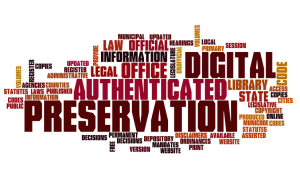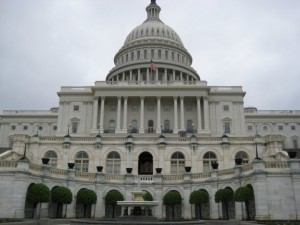VoxPopuLII
In the fall of 2009, the American Association of Law Libraries (AALL) put out a call for volunteers to participate in our new state working groups to support one of AALL’s top policy priorities: promoting the need for authentication and preservation of digital legal resources. It is AALL policy that the public have no-fee, permanent public access to authentic online legal information. In addition, AALL believes that government information, including the text of all primary legal materials, must be in the public domain and available without restriction.
The response to our call was overwhelming, with volunteers from all 50 states and the District of Columbia expressing interest in participating. To promote our public policy priorities, the initial goals of AALL’s working groups were to:
- Take action to oppose any plan in their state to eliminate an official print legal resource in favor of online-only, unless the electronic version is digitally authenticated and will be preserved for permanent public access;
- Oppose plans to charge fees to access legal information electronically; and
- Ensure that any legal resources in a state’s raw-data portal include a disclaimer so that users know that the information is not an official or authentic resource (similar to what is included on the Code of Federal Regulations XML on Data.gov).
In late 2009, AALL’s then-Director of Government Relations Mary Alice Baish met twice with Law Librarian of Congress Roberta Shaffer and Carl Malamud of Public.Resource.org to  discuss Law.gov and Malamud’s idea for a national inventory of legal materials. The inventory would include legal materials from all three branches of government. Mary Alice volunteered our working groups to lead the ambitious effort to contribute to the groundbreaking national inventory. AALL would use this data to update AALL’s 2003 “State-by-State Report on Permanent Public Access to Electronic Government Information” and the 2007 “State-by-State Report on Authentication of Online Legal Resources” and 2009-2010 updates, which revealed that a significant number of state online legal resources are considered to be “official” but that few are authenticating. It would also help the Law Library of Congress, which owns the Law.gov domain name, with their own ambitious projects.
discuss Law.gov and Malamud’s idea for a national inventory of legal materials. The inventory would include legal materials from all three branches of government. Mary Alice volunteered our working groups to lead the ambitious effort to contribute to the groundbreaking national inventory. AALL would use this data to update AALL’s 2003 “State-by-State Report on Permanent Public Access to Electronic Government Information” and the 2007 “State-by-State Report on Authentication of Online Legal Resources” and 2009-2010 updates, which revealed that a significant number of state online legal resources are considered to be “official” but that few are authenticating. It would also help the Law Library of Congress, which owns the Law.gov domain name, with their own ambitious projects.
Erika Wayne and Paul Lomio at Stanford University’s Robert Crown Law Library developed a prototype for the national inventory that included nearly 30 questions related to scope, copyright, cost to access, and other use restrictions. They worked with the California State Working Group and the Northern California Association of Law Libraries to populate the inventory with impressive speed, adding most titles in about two months.
AALL’s Government Relations Office staff then expanded the California prototype to include questions related to digital authentication, preservation, and permanent public access. Our volunteers used the following definition of “authentication” provided by the Government Printing Office:
An authentic text is one whose content has been verified by a government entity to be complete and unaltered when compared to the version approved or published by the content originator.
Typically, an authentic text will bear a certificate or mark that conveys information as to its certification, the process associated with ensuring that the text is complete and unaltered when compared with that of the content originator.
An authentic text is able to be authenticated, which means that the particular text in question can be validated, ensuring that it is what it claims to be.
The “Principles and Core Values Concerning Public Information on Government Websites,” drafted by AALL’s Access to Electronic Legal Information Committee (now the Digital Access to Legal Information Committee) and adopted by the Executive Board in 2007, define AALL’s commitment to equitable, no-fee, permanent public access to authentic online legal information. The principle related to preservation states that:
Information on government Web sites must be preserved by the entity, such as a state library, an archives division, or other agency, within the issuing government that is charged with preservation of government information.
- Government entities must ensure continued access to all their legal information.
- Archives of government information must be comprehensive, including all supplements.
- Snapshots of the complete underlying database content of dynamic Web sites should be taken regularly and archived in order to have a permanent record of all additions, changes, and deletions to the underlying data.
- Governments must plan effective methods and procedures to migrate information to newer technologies.
In addition, AALL’s 2003 “State-By-State Report on Permanent Public Access to Electronic Government Information” defines permanent public access as, “the process by which applicable government information is preserved for current, continuous and future public access.”
Our volunteers used Google Docs to add to the inventory print and electronic legal titles at the state, county, and municipal levels and answer a series of questions about each title. AALL’s Government Relations Office set up a Google Group for volunteers to discuss issues and questions. Several of our state coordinators developed materials to help other working groups, such as Six Easy Steps to Populating Your State’s Inventory by Maine State Working Group coordinator Christine Hepler, How to Put on a Successful Work Day for Your Working Group by Florida State Working Group co-coordinators Jenny Wondracek and Jamie Keller, and Tips for AALL State Working Groups with contributions from many coordinators.
In October 2010, AALL held a very successful webinar on how to populate the inventories. More than 200 AALL and chapter members participated in the webinar, which included Kentucky State Working Group coordinator Emily Janoski-Haehlen, Maryland State Working Group coordinator Joan Bellistri, and Indiana State Working Group coordinator Sarah Glassmeyer as speakers. By early 2011, more than 350 volunteers were contributing to the state inventories.
Initial Findings
 Our dedicated volunteers added more than 7,000 titles to the inventory in time for AALL’s June 30, 2011 deadline. AALL recognized our hard-working volunteers at our annual Advocacy Training during AALL’s Annual Meeting in Philadelphia, and celebrated their significant accomplishments. Timothy L. Coggins, 2010-11 Chair of the Digital Access to Legal Information Committee, presented these preliminary findings:
Our dedicated volunteers added more than 7,000 titles to the inventory in time for AALL’s June 30, 2011 deadline. AALL recognized our hard-working volunteers at our annual Advocacy Training during AALL’s Annual Meeting in Philadelphia, and celebrated their significant accomplishments. Timothy L. Coggins, 2010-11 Chair of the Digital Access to Legal Information Committee, presented these preliminary findings:
- Authentication: No state reported new resources that have been authenticated since the 2009-2010 Digital Access to Legal Information Committee survey
- Official status: Several states have designated at least one legal resource as official, including Arizona, Florida, and Maine
- Copyright assertions in digital version: Twenty-five states assert copyright on at least one legal resource, including Oklahoma, Pennsylvania, and Rhode Island
- Costs to access official version: Ten states charge fees to access the official version, including Kansas, Vermont, and Wyoming
- Preservation and Permanent Public Access: Eighteen states require preservation and permanent public access of at least one legal resource, including Tennessee, Virginia, and Washington
Analyzing and Using the Data
In July 2011, AALL’s Digital Access to Legal Information Committee formed a subcommittee that is charged with reviewing the national inventory data collected by the state working groups. The subcommittee includes Elaine Apostola (Maine State Law and Legislative Reference Library), A. Hays Butler (Rutgers University Law School Library), Sarah Gotschall (University of Arizona Rogers College of Law Library), and Anita Postyn (Richmond Supreme Court Library). Subcommittee members have been reviewing the raw data as entered by the working group volunteers in their state inventories. They will soon focus their attention on developing a report that will also act as an updated version of AALL’s State-by-State Report on Authentication of Online Legal Resources.
The report, to be issued later this year, will once again support what law librarians have known for years: there are widespread issues with access to legal resources and there is an imminent need to prevent a trend of eliminating print resources in favor of electronic resources without the proper safeguards in place. It will also include information on: the official status of legal resources; whether states are providing for authentication, permanent public access, and/or preservation of online legal resources; any use restrictions or copyright claims by the state; and whether a universal (public domain) citation format has been adopted by any courts in the state.
In addition to providing valuable information to the Law Library of Congress and related Law.gov projects, this information has already been helpful to various groups as they proceed to advocate for no-fee, permanent public access to government information. The data has already been useful to advocates of the Uniform Electronic Legal Material Act and will continue to be valuable to those seeking introduction and enactment in their states. The inventory has been used as a starting point for organizations that are beginning digitization projects of their state legal materials. The universal citation data will be used to track the progress of courts recognizing the value of citing official online legal materials through adopting a public domain citation system. Many state working group coordinators have also shared data with their judiciaries and legislatures to help expose the need for taking steps to protect our state legal materials.
The Next Steps: Federal Inventory
 In December 2010, we launched the second phase of this project, the Federal Inventory. The Federal Inventory will include:
In December 2010, we launched the second phase of this project, the Federal Inventory. The Federal Inventory will include:
- Legal research materials
- Information authored or created by agencies
- Resources that are publicly accessible
Our goals are the same as with the state inventories: to identify and answer questions about print and electronic legal materials from all three branches of government. Volunteers from Federal agencies and the courts are already adding information such as decisions, reports and digests (Executive); court opinions, court rules, and Supreme Court briefs (Judicial); and bills and resolutions, the Constitution, and Statutes at Large (Legislative). Emily Carr, Senior Legal Research Specialist at the Law Library of Congress, and Judy Gaskell, retired Librarian of the Supreme Court, are coordinating this project.
Thanks to the contributions of an army of AALL and chapter volunteers, the national inventory of legal materials is nearly complete. Keep an eye on AALL’s website for more information as our volunteers complete the Federal Inventory, analyze the data, and promote the findings to Federal, state and local officials.
 Tina S. Ching is the Electronic Services Librarian at Seattle University School of Law. She is the 2011-12 Chair of the AALL Digital Access to Legal Information Committee.
Tina S. Ching is the Electronic Services Librarian at Seattle University School of Law. She is the 2011-12 Chair of the AALL Digital Access to Legal Information Committee.
 Emily Feltren is Director of Government Relations for the American Association of Law Libraries.
Emily Feltren is Director of Government Relations for the American Association of Law Libraries.
[Editor’s Note: For topic-related VoxPopuLII posts please see: Barbara Bintliff, The Uniform Electronic Legal Material Act Is Ready for Legislative Action; Jason Eiseman, Time to Turn the Page on Print Legal Information; John Joergensen, Authentication of Digital Repositories.]
VoxPopuLII is edited by Judith Pratt. Editors-in-Chief are Stephanie Davidson and Christine Kirchberger, to whom queries should be directed. The information above should not be considered legal advice. If you require legal representation, please consult a lawyer.





Good article. I’ve been interested in this since it got started. I have 2 quick questions: Is the inventory available to the public? Are there any plans to turn it into a website that will actually let people connect to all those inventories resources?
Thanks,
Elmer.
Thanks Elmer! The Digital Access to Legal Information Committee will issue a report that will be available to the public later this year. Because the DALI Committee is currently in the process of analyzing the data, we have not made the list of inventories available. All of the inventories are publicly accessible through Google Docs and will be made available through AALLNET in the near future. If you’d like access in the meantime, feel free to contact Emily.
[…] and it is under consideration in ten states. In the meantime, AALL volunteers conducted a 50-state inventory to determine what materials are currently available online under what circumstances; their report […]
[…] Feltren and Tina S. Ching‘s February 2012 VoxPopuLII post, Protecting Access One Entry at a Time: An Update on the National Inventory of Legal […]
As a inventory clerk professional I find this article to be really usefull!
First of all I would like to thank you for your work! With all the defects my job has left me with, I found this article to be quite interesting!
One of the few things that surprised me was that a volunteer group has been called for a national inventory instead of a certified and accredited inventory company… Still the scale is massive and I can not hide my respect. I can not imagine how the inventory report was analysed.
PS.
There there are so much resources!
Thank you!
Paulin Labelle
Certified Inventory Clerk